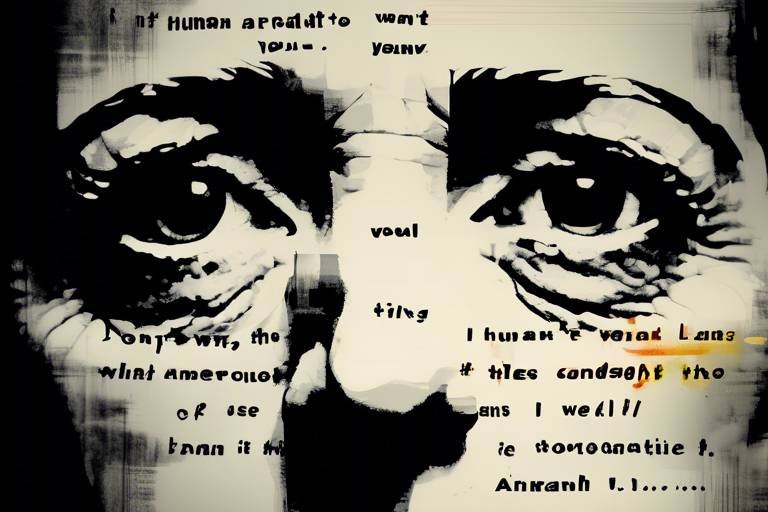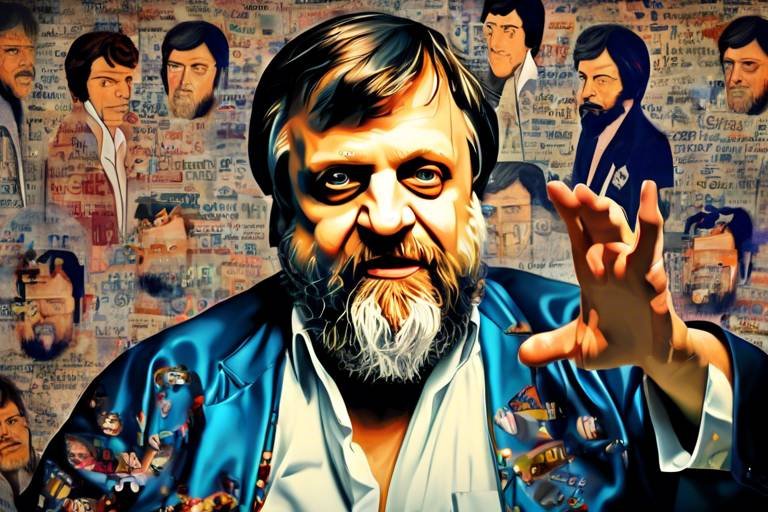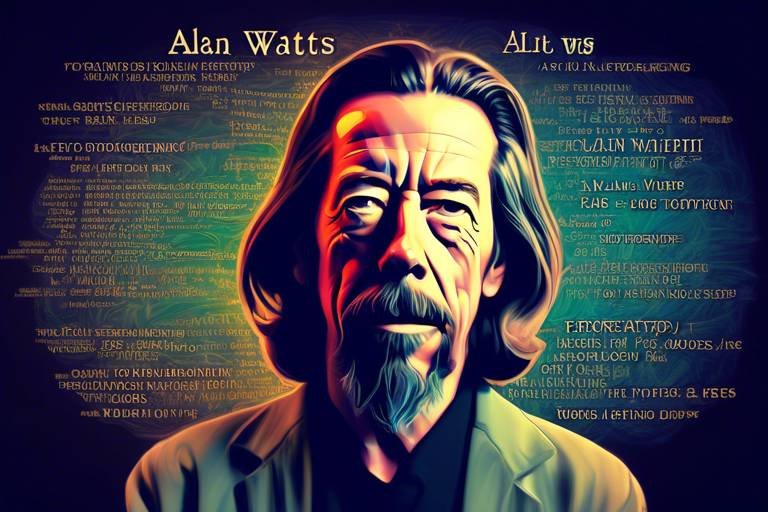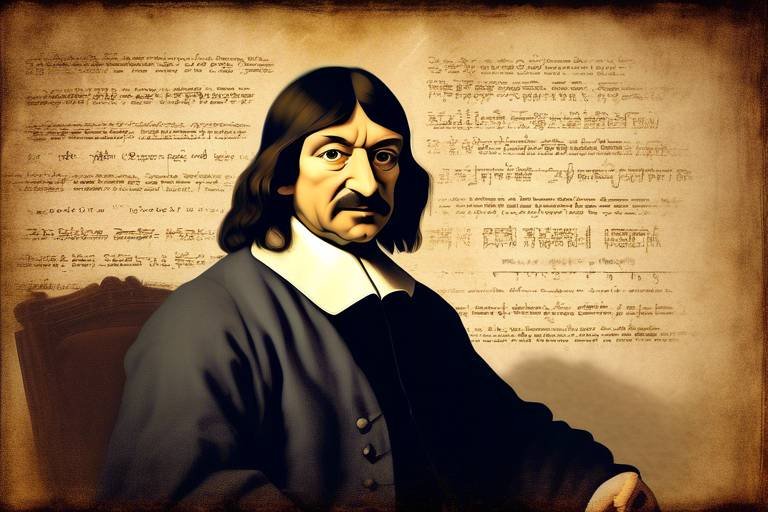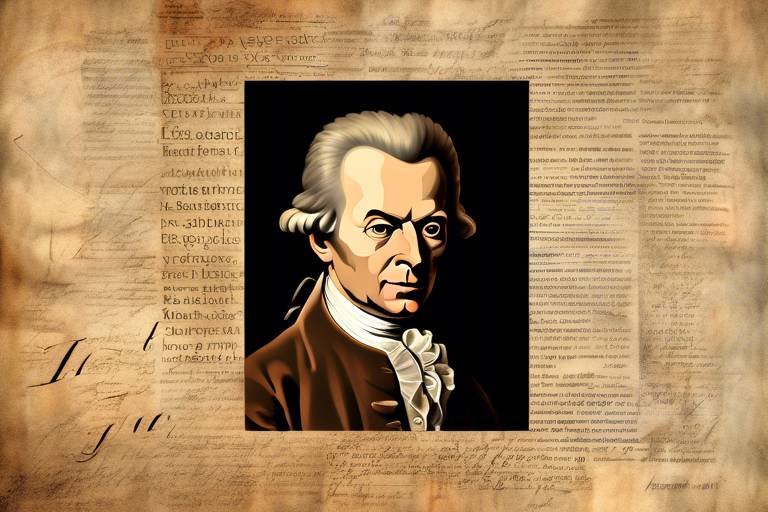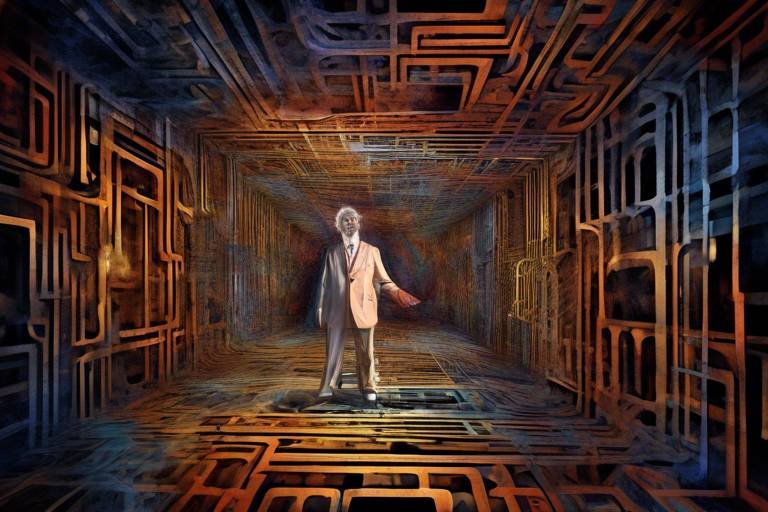Michel Foucault - A Shift in Postmodern Thinking
Michel Foucault is often hailed as a revolutionary thinker whose ideas have profoundly influenced postmodern philosophy. His work challenges traditional notions of knowledge, power, and subjectivity, inviting readers to reconsider how these concepts shape our understanding of society. Foucault's insights are not just academic musings; they resonate in our everyday lives, prompting us to question the structures that govern our existence. Whether you’re a philosophy enthusiast or someone intrigued by the dynamics of power and knowledge, Foucault's theories offer a lens through which we can critically examine our world.
At the heart of Foucault's philosophy is the idea that knowledge is inextricably linked to power. He argues that what we consider to be "truth" is often a product of social constructs rather than an objective reality. This perspective encourages a critical examination of how institutions—be they educational, governmental, or medical—shape our understanding of ourselves and our place in the world. Foucault's work is a call to arms for those who seek to understand the intricate dance between authority and individual autonomy. It urges us to recognize that our identities are not merely given but are instead constructed through discourse and societal norms.
To appreciate Foucault's impact fully, we must consider the historical context in which he wrote. The 20th century was a time of significant upheaval, marked by existentialist thought and the emergence of structuralism. These intellectual movements provided the backdrop against which Foucault developed his theories. He was not just a passive observer; rather, he actively engaged with the philosophical currents of his time, challenging their assumptions and expanding the horizons of thought. This interplay between context and theory is what makes Foucault's work so compelling and relevant today.
Foucault's exploration of power dynamics is particularly noteworthy. He posits that power is not simply a force wielded by the few over the many; instead, it is diffused throughout society, shaping our interactions and institutions in profound ways. This idea can be likened to a web, where each strand represents a relationship of power that influences individual behavior and societal norms. By understanding power in this way, we can begin to unravel the complexities of social order and individual subjectivity.
In conclusion, Michel Foucault's contributions to postmodern thinking are nothing short of transformative. His theories compel us to rethink our assumptions about knowledge, power, and identity, urging us to recognize the intricate ways in which they intersect. As we navigate the complexities of contemporary life, Foucault's insights remain a powerful tool for critical analysis and reflection.
- What are some of Foucault's most important works?
Some of his key texts include Discipline and Punish and The History of Sexuality, where he explores the relationship between power and societal norms.
- How did Foucault influence modern philosophy?
Foucault's ideas about power/knowledge and discourse have reshaped contemporary thought, particularly in fields like sociology and cultural studies.
- What is biopolitics?
Biopolitics refers to the strategies and mechanisms through which human life is managed by political power, particularly concerning health and sexuality.

Foucault's Historical Context
To truly grasp the revolutionary ideas of Michel Foucault, it’s essential to dive into the vibrant and tumultuous historical landscape of the 20th century. This era was marked by a plethora of intellectual movements and socio-political upheavals that significantly influenced Foucault's thinking. Imagine a time when the world was grappling with existential questions, battling the shadows of war, and witnessing the rise of new ideologies—this was the backdrop against which Foucault developed his theories.
One of the most significant influences on Foucault was existentialism, a philosophical movement that emphasized individual freedom and choice. Think of existentialism as a lens through which one could view the world, focusing on personal experience and the quest for meaning in a seemingly indifferent universe. This perspective challenged traditional notions of truth and morality, setting the stage for Foucault's later explorations into how knowledge is constructed.
Additionally, the impact of structuralism cannot be overlooked. This intellectual current sought to uncover the underlying structures that govern human culture and thought. For Foucault, structuralism provided a framework to analyze social institutions and their roles in shaping human behavior. However, he diverged from strict structuralist thought, arguing that these structures are not static but are constantly evolving and intertwined with power dynamics.
The socio-political upheavals of the time, such as the civil rights movements and the sexual revolution, also played a crucial role in shaping Foucault's ideas. These movements challenged established norms and hierarchies, prompting a re-examination of power relations within society. Foucault was particularly interested in how these movements revealed the complexities of power, not just as a top-down force but as something that permeates every level of society.
In this context, Foucault's work can be seen as a response to the prevailing ideologies of his time. He sought to deconstruct traditional narratives and expose the mechanisms of control that operate within various institutions. By examining the intersection of power, knowledge, and discourse, Foucault opened up new avenues for understanding how individuals navigate their identities within societal frameworks.
In summary, the historical context in which Foucault wrote was rich with conflict and transformation. It was a time that questioned the very foundations of knowledge and power. Understanding this backdrop not only enhances our appreciation of Foucault's work but also sheds light on the ongoing relevance of his ideas in contemporary discussions about identity, power, and social structures.

Key Concepts in Foucault's Philosophy
Michel Foucault's philosophy is a treasure trove of ideas that challenge our conventional understanding of society, knowledge, and power. His work invites us to rethink the very frameworks through which we interpret our experiences. One of the most striking aspects of Foucault's thought is his exploration of the relationship between power and knowledge. He argues that these two elements are inextricably linked; power produces knowledge, and knowledge reinforces power. This creates a dynamic where truth is not an absolute but a construct shaped by societal contexts and power relations.
To illustrate this, consider how various institutions—like schools, prisons, and hospitals—function not just as places of learning, punishment, or healing, but as mechanisms that disseminate knowledge and norms. Through these institutions, societal values are propagated, and individuals are conditioned to accept certain truths as self-evident. This brings us to another critical concept in Foucault's work: discourse. Discourse refers to the ways in which language and societal narratives shape our understanding of reality and identity. In essence, the language we use is not merely a tool for communication; it actively constructs our perceptions of ourselves and others.
Foucault also introduces the idea of biopolitics, which examines how states exert control over populations through policies that govern life, health, and sexuality. This concept reflects a shift in governance strategies, where the focus moves from sovereign power—which is about the right to take life or let live—to a more nuanced form of power that seeks to optimize and regulate life itself. Biopolitics raises important questions about autonomy and individual rights, as it highlights the ways in which our lives are shaped by external forces.
In summary, Foucault's key concepts—power/knowledge, discourse, and biopolitics—offer us profound insights into the structures that influence our lives. They challenge us to reconsider how we understand authority, identity, and societal norms. To grasp the depth of these ideas, let's break them down further:
| Concept | Description |
|---|---|
| Power/Knowledge | Power is productive and shapes our understanding of truth within societal contexts. |
| Discourse | Language and societal narratives construct individual identities and influence perceptions. |
| Biopolitics | States exercise control over populations through governance of life, health, and sexuality. |
These concepts not only reshape our understanding of social institutions but also provoke critical reflections on our own identities and the power dynamics that permeate our everyday lives. Foucault's work serves as a mirror, reflecting the complexities of modern existence and urging us to question the very foundations of our beliefs and practices.
- What is Foucault's main contribution to philosophy? Foucault's main contribution lies in his analysis of the relationship between power and knowledge, which challenges traditional views of authority and truth.
- How does Foucault define discourse? Foucault defines discourse as the ways in which language and societal narratives shape our understanding of reality and identity.
- What is biopolitics according to Foucault? Biopolitics refers to the strategies by which states regulate populations through policies that govern aspects of life, health, and sexuality.

Power and Knowledge
Michel Foucault’s exploration of the relationship between power and knowledge is one of the cornerstones of his philosophical contributions. He famously argued that power is not merely a top-down force exerted by institutions or authorities; rather, it is intricately woven into the fabric of knowledge itself. This concept challenges the traditional notion that knowledge is neutral and objective. Instead, Foucault posits that knowledge is produced within power relations, meaning that what we accept as 'truth' is often shaped by the dominant power structures of society.
To illustrate this, consider how different societies have defined concepts such as madness or deviance. The way these terms are understood is not just a reflection of scientific inquiry but also of the prevailing social norms and power dynamics. For instance, in the past, individuals labeled as 'insane' were often subjected to harsh treatments in asylums, not solely based on medical criteria but also on societal fears and the need for control. This intertwining of power and knowledge reveals how societal narratives can dictate what is considered normal or acceptable.
Foucault's notion of power/knowledge implies that knowledge production is a political act. This means that every discipline—from sociology to medicine—carries with it the weight of power relations. The implications of this are profound: it suggests that those who control knowledge also wield significant power over how individuals perceive themselves and their realities. For example, the medicalization of certain behaviors has often led to the pathologization of what was once considered mere variations of human experience. This is evident in the historical treatment of homosexuality, which was once classified as a mental disorder, illustrating how power dynamics can shape knowledge.
Moreover, Foucault introduces the idea of regimes of practices, which refers to the ways in which knowledge is produced and maintained through social practices. These regimes dictate what constitutes acceptable knowledge and who gets to produce it. In this sense, knowledge is not just about facts and figures; it is a tool that can be wielded to maintain or challenge power structures. This perspective encourages us to critically examine the sources of our knowledge and the motivations behind them.
In conclusion, Foucault's exploration of power and knowledge forces us to reconsider the foundations of our understanding of truth. It prompts us to ask critical questions: Who benefits from the knowledge we accept? How is this knowledge used to control or liberate individuals? By recognizing the complex interplay between power and knowledge, we can begin to dismantle the systems that shape our perceptions and challenge the status quo.
- What does Foucault mean by power/knowledge?
Foucault's concept of power/knowledge suggests that knowledge is produced within power relations, meaning that what we accept as truth is influenced by the dominant power structures in society. - How does Foucault's idea of power differ from traditional views?
Unlike traditional views that see power as a repressive force exerted from the top down, Foucault argues that power is productive and permeates all levels of society, shaping knowledge and truth. - Why is the relationship between power and knowledge important?
Understanding this relationship is crucial as it reveals how societal norms and power dynamics influence our perceptions, behaviors, and identities, prompting critical examination of accepted truths.

Disciplinary Power
Michel Foucault's concept of is a cornerstone of his philosophical inquiry, shedding light on how modern societies control and regulate behavior. Unlike traditional forms of power that rely on overt force or coercion, disciplinary power operates subtly, embedding itself within institutions such as schools, prisons, and hospitals. It is as if society has woven a complex tapestry of surveillance and normalization, where individuals are constantly monitored and evaluated, shaping their actions and thoughts without them even realizing it.
Imagine a school where students are not just taught but are also subtly guided to conform to certain behaviors and norms. This is a prime example of disciplinary power in action. It’s not merely about punishment for misbehavior but rather about creating a system where compliance becomes second nature. Foucault argues that this power is productive; it generates knowledge about individuals, categorizing them and influencing their subjectivity. This means that the very act of being observed can change behavior, a phenomenon known as the Panopticon effect, derived from Jeremy Bentham's architectural design for prisons. In this design, a single guard can observe all inmates without them knowing whether they are being watched, leading to self-regulation among the prisoners.
Furthermore, disciplinary power extends beyond physical institutions; it permeates social practices and cultural norms. It shapes our understanding of what is considered "normal" behavior and what is not, often through the lens of societal expectations. For instance, the way we dress, speak, and even think can be influenced by these disciplinary mechanisms, which are reinforced by various societal institutions. This creates a cycle where individuals internalize societal norms, leading to a form of self-discipline that aligns with the expectations imposed by the society they inhabit.
In essence, Foucault invites us to critically examine the ways in which power operates in our lives. He challenges us to recognize that power is not merely a top-down phenomenon but is intricately linked to our everyday interactions and self-perceptions. By understanding disciplinary power, we can begin to see how deeply entrenched systems of control operate, often under the guise of social order and safety. This recognition is the first step toward questioning and potentially resisting the subtle influences that shape our identities and behaviors.
- What is disciplinary power? Disciplinary power refers to a form of power that regulates behavior and thought through subtle means, such as surveillance and normalization, rather than through overt force.
- How does Foucault's concept of disciplinary power apply to modern society? It highlights how institutions like schools, prisons, and hospitals shape individual identities and behaviors by creating norms that individuals internalize.
- What is the Panopticon effect? The Panopticon effect describes a situation where individuals regulate their own behavior due to the possibility of being observed, leading to self-discipline.
- Why is understanding disciplinary power important? Recognizing how disciplinary power operates can help individuals question societal norms and resist subtle forms of control that shape their identities and behaviors.

Biopolitics
When we delve into , we uncover a fascinating intersection of power and governance that fundamentally reshapes our understanding of life itself. Foucault introduced this concept to highlight how modern states exert control over their populations not just through laws and regulations, but through the management of life, health, and even sexuality. Imagine a vast web of influence where the state is not merely a distant authority but an active participant in the daily lives of individuals. This is where biopolitics comes into play.
At its core, biopolitics reveals how power operates at the level of the population, focusing on the biological and social aspects of life. Foucault argued that in contemporary society, the regulation of life has become a primary concern for governments. This means that policies regarding health care, reproductive rights, and public health initiatives are not just about maintaining order; they are about shaping the very essence of what it means to be human. Think about it: when a government implements a vaccination program, it’s not merely a public health measure; it’s a way of exercising control over the bodies and lives of its citizens.
Foucault's exploration of biopolitics can be broken down into several key aspects:
- Regulation of Populations: Governments create policies that affect birth rates, mortality rates, and overall public health, aiming to optimize the health of the population.
- Surveillance Mechanisms: The use of data collection and monitoring systems to track health trends and behaviors enhances the state's ability to intervene in the lives of individuals.
- Normalization: Societal norms regarding health, sexuality, and behavior are established, creating standards that individuals feel pressured to conform to.
One striking example of biopolitics in action is the way in which states respond to health crises. During the COVID-19 pandemic, governments worldwide implemented measures such as lockdowns, mask mandates, and vaccination campaigns. These actions were not just about preventing illness; they were also about controlling the population's behavior and ensuring compliance with public health directives. This dual role of governance—both protective and controlling—illustrates the complexities of biopolitics.
Furthermore, Foucault's concept of biopolitics challenges us to think critically about the implications of state intervention in personal lives. It raises important questions: To what extent should the government regulate our health choices? Where do we draw the line between public safety and personal freedom? As we navigate these issues, Foucault’s insights remind us that the management of life is inherently linked to power dynamics, and understanding this relationship is crucial for fostering a more equitable society.

Discourse and Subjectivity
When we dive into Michel Foucault's exploration of discourse, we uncover a fascinating layer of how language shapes our very identities. Foucault posits that discourse isn’t just a way of communicating; it’s a powerful tool that constructs our understanding of the world and ourselves. Imagine discourse as a lens through which we view reality—each word, phrase, and narrative influences how we perceive our roles in society, our relationships, and even our personal beliefs.
At the heart of Foucault's theory is the idea that subjectivity—the way we see ourselves and our place in the world—is not something innate or fixed. Instead, it is fluid and constantly reshaped by the discourses that surround us. These discourses are formed by various social institutions, including education, media, and even family structures. They dictate what is considered "normal" or "acceptable," often marginalizing those who do not conform. Think of it this way: just as a sculptor chisels away at a block of stone to reveal a statue, societal discourses carve out our identities, often without us even realizing it.
Foucault also highlights the role of power in shaping discourse. He argues that power is everywhere, embedded in the very language we use. It’s not just about who holds authority but how that authority influences what can be said and who gets to say it. For instance, consider how certain narratives dominate discussions about mental health, often sidelining alternative perspectives. This creates a hierarchy of knowledge, where some voices are amplified while others are silenced. In this sense, discourse becomes a battleground for identity and power.
To illustrate Foucault's ideas further, let’s consider a few examples of how discourse shapes subjectivity:
- Media Representation: The portrayal of different genders, races, and social classes in media can significantly influence public perception and self-identity.
- Educational Systems: Curriculum choices often reflect societal values, shaping what knowledge is deemed important and who is considered an expert.
- Social Norms: The language used in everyday conversations can reinforce or challenge societal norms, affecting how individuals see themselves within those frameworks.
Foucault's analysis of discourse invites us to critically examine the narratives we encounter daily. By questioning the dominant discourses, we can begin to understand how they shape our subjectivities and, ultimately, our actions. This critical approach encourages us to engage with alternative narratives, fostering a more inclusive understanding of identity that transcends traditional boundaries.
In summary, Foucault’s insights into discourse and subjectivity reveal the intricate connections between language, power, and identity. They challenge us to reconsider how we construct our self-identity and how societal structures influence our perceptions. By becoming aware of these dynamics, we can empower ourselves to navigate and reshape the discourses that define our lives.
- What is Foucault's concept of discourse? Foucault's concept of discourse refers to the way language and narratives shape our understanding of reality and identity, influencing how we see ourselves and others.
- How does discourse affect subjectivity? Discourse affects subjectivity by constructing the frameworks through which we interpret our experiences, often dictating what is considered normal or acceptable in society.
- Why is power important in Foucault's theory? Power is crucial in Foucault's theory because it influences which discourses are dominant, shaping knowledge and identity in ways that can marginalize certain voices.

Foucault's Major Works
Michel Foucault’s oeuvre is a treasure trove of insights that have fundamentally reshaped our understanding of society, power, and the individual. Among his most significant works, Discipline and Punish and The History of Sexuality stand out as pivotal texts that not only showcase his innovative methodologies but also illustrate the evolution of his thought. In Discipline and Punish, Foucault takes us on a journey through the history of punishment, revealing how society transitioned from overt physical punishment to more subtle forms of psychological control. This transformation, he argues, reflects a broader shift in societal norms and values, where the focus moved from punishing the body to regulating the mind.
In this work, Foucault meticulously examines the mechanisms of power that underpin modern disciplinary institutions, such as prisons and schools. He suggests that these institutions are not just places of confinement but rather sites of knowledge production that shape our understanding of morality and deviance. The implications of this are profound: the way we perceive punishment today is deeply intertwined with the historical shifts that Foucault meticulously documents.
On the other hand, The History of Sexuality delves into the intricate relationship between sexuality and power. Foucault challenges the conventional wisdom that the Victorian era was a time of sexual repression. Instead, he argues that this period was characterized by an explosion of discourse surrounding sexuality. The book is divided into several volumes, with the first volume, titled The Will to Knowledge, laying the groundwork for understanding how societal norms dictate our sexual behaviors and identities.
In both works, Foucault employs a unique methodology that blends historical analysis with philosophical inquiry. He utilizes a technique he calls archaeology, which involves digging through layers of historical texts and discourses to uncover the underlying assumptions and power relations that shape our understanding of various subjects. This approach allows readers to see how knowledge is constructed and how it influences societal norms and individual behavior.
To give you a clearer picture of Foucault's contributions, here’s a table summarizing his major works and their themes:
| Title | Theme | Key Concepts |
|---|---|---|
| Discipline and Punish | Transformation of punishment | Disciplinary power, surveillance, normalization |
| The History of Sexuality | Sexuality and power dynamics | Biopolitics, discourse, the will to knowledge |
Foucault’s major works have not only influenced philosophy but have also permeated various fields such as sociology, cultural studies, and political theory. His ideas compel us to rethink the structures of power that govern our lives and challenge us to question the narratives we accept as truths. The legacy of Foucault is a call to remain vigilant about the forces that shape our understanding of self and society.
- What is the main argument of Foucault's Discipline and Punish?
Foucault argues that modern punishment has shifted from physical torture to psychological control, revealing how societal institutions regulate behavior and thought. - How does Foucault define biopolitics?
Biopolitics refers to the ways in which states exert control over populations through policies that govern life, health, and sexuality. - Why is Foucault's History of Sexuality important?
This work critiques traditional narratives about sexuality, illustrating how power dynamics shape our understanding of sexual behavior throughout history.

Discipline and Punish
In , Michel Foucault embarks on a fascinating journey through the evolution of punishment in society, revealing how it has shifted from the brutal physical tortures of the past to the more subtle, psychological forms of control prevalent today. This transformation is not merely about changing methods; it signifies a profound shift in how power operates within society. Foucault's analysis begins with the public executions of the 18th century, where punishment was a spectacle, a form of power displayed for all to see. However, as society evolved, so did the mechanisms of control. The focus transitioned from punishing the body to regulating the mind.
Foucault illustrates this transition through the concept of disciplinary power, which is characterized by surveillance, normalization, and examination. Instead of relying on overt violence, modern institutions—like schools, prisons, and hospitals—employ more insidious methods to maintain order and conformity. The panopticon, a theoretical prison design proposed by Jeremy Bentham, serves as a powerful metaphor for this shift. In a panopticon, a single guard can observe all inmates without them knowing whether they are being watched. This uncertainty compels individuals to regulate their own behavior, creating a self-disciplining citizenry.
Foucault argues that this form of power is not just repressive; it is also productive. It shapes our understanding of what is considered normal or deviant behavior, influencing everything from our social interactions to our personal identity. The implications of this are vast, as it means that individuals are not merely victims of power but active participants in their own subjugation. In this way, the modern individual becomes a product of disciplinary mechanisms, molded by societal expectations and norms.
Moreover, Foucault's exploration of punishment extends into the realm of biopolitics, where he examines how state power governs not just individuals but entire populations. The regulation of life, health, and sexuality becomes a focal point for modern governance, reflecting a shift from sovereign power—exercised through the right to kill—to a more pervasive form of control that seeks to optimize and manage life itself. This shift raises critical questions about autonomy, freedom, and the nature of power in contemporary society.
Ultimately, challenges us to reconsider our understanding of justice, punishment, and the structures that underpin our social institutions. It invites readers to reflect on the ways in which power operates in their own lives and the subtle mechanisms that shape their identities. Foucault’s work serves as a crucial lens through which we can examine the complexities of modern society, urging us to question the very foundations of our understanding of authority and control.
- What is the main theme of Foucault's Discipline and Punish?
The main theme revolves around the evolution of punishment and the shift from physical torture to psychological control, highlighting how power operates through disciplinary mechanisms.
- How does Foucault define disciplinary power?
Disciplinary power is defined as a form of power that regulates behavior through surveillance, normalization, and examination, rather than through overt violence.
- What is the significance of the panopticon in Foucault's analysis?
The panopticon serves as a metaphor for modern disciplinary power, illustrating how surveillance creates a self-regulating society where individuals conform to societal norms.
- How does Discipline and Punish relate to contemporary issues of power and authority?
Foucault's insights into disciplinary mechanisms help us understand contemporary issues related to surveillance, control, and the regulation of behavior in various social institutions.

and
This article explores the profound impact of Michel Foucault on postmodern philosophy, analyzing his key concepts, works, and the ways he challenged traditional structures of knowledge and power.
Understanding Foucault's ideas requires examining the historical and intellectual milieu of the 20th century, including the influence of existentialism, structuralism, and the socio-political upheavals that shaped his thinking.
Foucault introduced several pivotal concepts, including power/knowledge, discourse, and biopolitics, which have reshaped how we understand social institutions and their influence on individual subjectivity.
Foucault's notion of power/knowledge emphasizes that power is not just repressive but productive, shaping our understanding of truth and knowledge within societal contexts.
The concept of disciplinary power reveals how institutions regulate behavior and thought through surveillance and normalization, fundamentally altering individual autonomy and societal norms.
Biopolitics addresses how states exercise control over populations through policies and practices that govern life, health, and sexuality, reflecting a shift in governance strategies.
Foucault's analysis of discourse highlights how language and societal narratives construct individual identities and subjectivities, influencing how we perceive ourselves and others.
Examining Foucault's key texts, such as Discipline and Punish and The History of Sexuality, provides insights into his methodologies and the evolution of his thought.
In Discipline and Punish, Foucault explores the transformation of punishment from physical torture to psychological control, illustrating the broader implications for modern society.
This work critiques the ways sexual behavior has been regulated and understood, challenging conventional narratives about sexuality and power throughout history.
Foucault's theories continue to influence various fields, including sociology, cultural studies, and critical theory, prompting ongoing discussions about power dynamics and social constructs.
His ideas have been instrumental in shaping contemporary social theory, particularly in understanding how institutions perpetuate power relations and influence individual behavior.
While influential, Foucault's theories have faced critiques regarding their applicability and the potential for misinterpretation, prompting debates about the limitations of his frameworks in contemporary analysis.
- What is Michel Foucault known for?
Michel Foucault is known for his work on the relationship between power and knowledge, as well as his analyses of social institutions and their impact on individual subjectivity. - How did Foucault influence postmodern philosophy?
Foucault challenged traditional notions of power and truth, emphasizing that knowledge is shaped by social contexts and power relations, which has significantly influenced postmodern thought. - What are some of Foucault's major works?
Some of Foucault's major works include Discipline and Punish and The History of Sexuality, both of which explore themes of power, control, and societal norms.

The History of Sexuality,
In The History of Sexuality, Michel Foucault embarks on a daring exploration of how sexual behavior has been perceived, regulated, and understood throughout history. He challenges the conventional narratives that suggest a linear progression in the understanding of sexuality, arguing instead that sexuality has been a complex interplay of power, knowledge, and societal norms. Foucault's work reveals that rather than being a repressed subject, sexuality has been a focal point of discourse and regulation, shaped by various institutions such as the church, the state, and the medical community.
One of the most striking aspects of Foucault's argument is his assertion that the discourse surrounding sexuality has not merely been about repression but has also been about the creation of knowledge. He posits that the way we talk about sex influences our understanding of it, shaping our desires, identities, and behaviors. This intertwining of power and knowledge forms the crux of what Foucault refers to as biopower, a form of power that manages populations through the regulation of bodies and sexuality.
Foucault critiques the historical narrative that positions the Victorian era as a time of sexual repression. Instead, he suggests that this period saw an explosion of discourse about sex, as various institutions sought to define and control sexual behavior. He emphasizes that the regulation of sexuality is not merely a matter of prohibitions but involves a myriad of practices aimed at categorizing and normalizing sexual behavior. This perspective invites readers to reconsider the implications of societal norms on personal identity and sexual expression.
To illustrate his points, Foucault delves into historical texts, medical writings, and legal documents, revealing how they have contributed to the construction of sexual identities. He identifies three key mechanisms through which societies have historically engaged with sexuality:
- Confession: The act of confessing one’s sexual desires and practices has been a powerful tool in the regulation of sexuality, enabling institutions to exert control over individual identities.
- Surveillance: The constant observation and categorization of sexual behavior have shaped societal norms, creating a landscape where individuals internalize the expectations placed upon them.
- Normalization: Societal standards dictate what constitutes 'normal' sexual behavior, influencing how individuals perceive their own sexuality and that of others.
Foucault's analysis extends beyond mere historical inquiry; it raises critical questions about the implications of sexual regulation in contemporary society. His work compels us to examine how modern discourses around sexuality continue to shape our identities and social structures. By understanding the historical context of sexuality, we can better navigate the complexities of our contemporary sexual landscape, recognizing the ongoing influence of power dynamics on our personal lives.
What is the main argument of Foucault in The History of Sexuality?
Foucault argues that sexuality has been a site of power and knowledge, where societal institutions regulate and shape our understanding of sexual behavior rather than simply repressing it.
How does Foucault's work challenge traditional views on sexuality?
Foucault challenges the notion that sexual repression is a recent phenomenon, suggesting instead that discourse about sexuality has been prolific and influential throughout history, particularly during periods often deemed repressive.
What are the implications of Foucault's analysis for contemporary discussions about sexuality?
Foucault's insights encourage us to question current norms and understandings of sexuality, revealing how power dynamics continue to shape our identities and behaviors today.

provides insights into his methodologies and the evolution of his thought.
This article explores the profound impact of Michel Foucault on postmodern philosophy, analyzing his key concepts, works, and the ways he challenged traditional structures of knowledge and power.
Understanding Foucault's ideas requires examining the historical and intellectual milieu of the 20th century, including the influence of existentialism, structuralism, and the socio-political upheavals that shaped his thinking.
Foucault introduced several pivotal concepts, including power/knowledge, discourse, and biopolitics, which have reshaped how we understand social institutions and their influence on individual subjectivity.
Foucault's notion of power/knowledge emphasizes that power is not just repressive but productive, shaping our understanding of truth and knowledge within societal contexts.
The concept of disciplinary power reveals how institutions regulate behavior and thought through surveillance and normalization, fundamentally altering individual autonomy and societal norms.
Biopolitics addresses how states exercise control over populations through policies and practices that govern life, health, and sexuality, reflecting a shift in governance strategies.
Foucault's analysis of discourse highlights how language and societal narratives construct individual identities and subjectivities, influencing how we perceive ourselves and others.
Examining Foucault's key texts, such as Discipline and Punish and The History of Sexuality, provides insights into his methodologies and the evolution of his thought.
In Discipline and Punish, Foucault explores the transformation of punishment from physical torture to psychological control, illustrating the broader implications for modern society.
This work critiques the ways sexual behavior has been regulated and understood, challenging conventional narratives about sexuality and power throughout history.
Foucault's theories continue to influence various fields, including sociology, cultural studies, and critical theory, prompting ongoing discussions about power dynamics and social constructs.
His ideas have been instrumental in shaping contemporary social theory, particularly in understanding how institutions perpetuate power relations and influence individual behavior.
While influential, Foucault's theories have faced critiques regarding their applicability and the potential for misinterpretation, prompting debates about the limitations of his frameworks in contemporary analysis.
Michel Foucault's methodologies were as revolutionary as his ideas. He employed a unique blend of historical analysis, critical theory, and philosophical inquiry to dissect the complexities of power and knowledge. His approach was not merely academic; it was deeply intertwined with the socio-political climate of his time. Foucault's work often involved a meticulous examination of historical texts and practices, revealing how societal norms and institutions shape our understanding of reality.
One of the key elements of his methodology was the use of genealogy, a term he borrowed from Nietzsche. This approach allowed him to trace the development of ideas and practices over time, uncovering the power dynamics at play. For example, in his analysis of punishment, he didn't just look at the laws but delved into the cultural and historical contexts that led to the evolution of penal systems. This method revealed the underlying mechanisms of control and discipline that permeate society.
Another significant aspect of Foucault's methodology was his focus on archaeology, which involved excavating layers of meaning in historical documents and discourses. By doing so, he aimed to expose the assumptions and beliefs that inform our current understanding of truth and knowledge. This archaeological approach is evident in his works like The History of Sexuality, where he critiques the historical narratives surrounding sexuality and power.
Foucault's evolution as a thinker was marked by a shift from a focus on institutions and their power to a more nuanced understanding of how individuals internalize power structures. This transition is crucial for grasping the depth of his influence on contemporary thought. He challenged the notion of the autonomous subject, suggesting that our identities are shaped by the discourses and power relations that surround us. In this way, Foucault's work continues to resonate, prompting us to question the very foundations of our knowledge and beliefs.
- What is Michel Foucault best known for?
Michel Foucault is best known for his theories on power, knowledge, and discourse, which have significantly influenced postmodern thought. - How did Foucault's background influence his philosophy?
Foucault's background in philosophy and psychology, combined with the socio-political upheavals of the 20th century, shaped his critical approach to understanding society. - What is the significance of Foucault's concept of biopolitics?
Biopolitics is significant as it examines how states regulate populations through various forms of governance, impacting our lives in profound ways. - Can Foucault's theories be applied today?
Yes, Foucault's theories remain relevant in contemporary discussions about power dynamics, identity, and social institutions.

Discipline and Punish
In , Michel Foucault takes us on a gripping journey through the evolution of punishment in society. Gone are the days when punishment was a public spectacle, filled with physical torture and bloodshed. Instead, Foucault reveals a subtle yet profound transformation where power operates through more insidious means. He illustrates how modern society has shifted from overtly violent forms of punishment to a system of surveillance and control that permeates our daily lives.
Foucault argues that this shift is not merely a change in methods but a fundamental alteration in how we understand power itself. Rather than being something that is simply wielded by the state or institutions, power is now seen as a pervasive force that shapes our behaviors and thoughts. This is encapsulated in his concept of disciplinary power, which operates through various institutions such as schools, prisons, and hospitals. These institutions do not just punish; they actively shape individuals into compliant subjects.
One of the most striking aspects of Foucault's analysis is how he connects the evolution of punishment to broader societal changes. In the past, punishment was a public affair, designed to instill fear and deter crime. However, as society progressed, the focus shifted towards rehabilitation and normalization. This shift can be summarized in the following key points:
- Surveillance: The modern individual is constantly monitored, whether through CCTV cameras in public spaces or the data collected by digital devices.
- Normalization: Society imposes standards of behavior that individuals are expected to conform to, often leading to self-regulation.
- Psychological Control: Rather than inflicting pain, modern punishment often involves psychological manipulation, influencing how individuals think about themselves and their actions.
Foucault's exploration of these themes culminates in a powerful critique of the justice system. He posits that the very structures we rely on to maintain order often serve to reinforce existing power dynamics and social inequalities. The prison system, for instance, is not just about containing criminals; it's a mechanism for producing a certain type of citizen—one who is docile and compliant.
By dissecting the mechanisms of power within these institutions, Foucault invites us to reconsider our understanding of freedom and autonomy. Are we truly free if our thoughts and behaviors are constantly shaped by external forces? This question resonates deeply in today's world, where surveillance and control are more pervasive than ever, making Foucault's insights incredibly relevant.
Ultimately, is not just a historical analysis; it is a call to awareness. Foucault urges us to recognize the subtle ways in which power operates in our lives, compelling us to question the norms and structures that govern us. In doing so, he challenges us to envision a society where power is not merely accepted but actively interrogated and resisted.
- What is the main argument of Foucault in Discipline and Punish?
Foucault argues that modern punishment has shifted from physical torture to disciplinary methods that control and normalize behavior through surveillance and psychological manipulation. - How does Foucault define disciplinary power?
Disciplinary power is a form of power that regulates behavior through institutions such as schools and prisons, shaping individuals into compliant subjects. - What relevance do Foucault's ideas have today?
Foucault's insights are incredibly relevant today as we navigate issues of surveillance, control, and the impact of institutions on individual autonomy.

Discipline and Punish,
In Discipline and Punish, Michel Foucault embarks on a profound exploration of the evolution of punishment, tracing its metamorphosis from the brutal and public spectacles of physical torture to the more insidious forms of psychological control that characterize modern society. This shift is not merely a change in methods; it represents a fundamental transformation in how power operates within social institutions. Foucault's analysis reveals that as societies evolve, so too do their mechanisms of control and discipline, which are often cloaked in the guise of progress and enlightenment.
Foucault begins by examining the historical context of punishment, highlighting how public executions were once a common spectacle designed to instill fear and maintain order. However, as society progressed, the focus shifted from the body of the criminal to the mind and behavior of individuals. This shift signifies a move towards a more subtle and pervasive form of power—one that operates not through overt violence but through surveillance, normalization, and the regulation of conduct.
The concept of disciplinary power emerges as a central theme in Foucault's work. He argues that modern institutions, such as prisons, schools, and hospitals, utilize disciplinary techniques to shape individuals into compliant members of society. These institutions employ strategies that include constant surveillance, the establishment of norms, and the imposition of regulations that dictate acceptable behavior. In essence, disciplinary power transforms individuals into subjects who internalize societal expectations, thus perpetuating the cycle of control.
Foucault's analysis of punishment also delves into the implications of this disciplinary regime. He posits that the shift from physical punishment to psychological control has profound effects on individual autonomy and identity. The individual is no longer merely a subject of punishment; they become an active participant in their own surveillance and regulation. This self-regulation is a hallmark of modernity, where individuals are conditioned to conform to societal norms, often at the expense of their own desires and freedoms.
To illustrate these concepts, Foucault employs various historical examples, including the transition from the gallows to the prison system. He highlights how the prison system is not just a place for punishment but a mechanism for training individuals to behave in ways that are deemed acceptable by society. The prison, in this sense, becomes a microcosm of broader societal dynamics, reflecting the intricate relationship between power, knowledge, and subjectivity.
Through Discipline and Punish, Foucault challenges readers to reconsider their understanding of justice and punishment. He invites us to question the morality of our systems of control and to recognize the ways in which they shape our identities and experiences. By exposing the underlying mechanisms of power, Foucault encourages a critical examination of the structures that govern our lives, prompting us to ask: Who truly holds the power, and at what cost does our social order come?
- What is the main argument of Foucault in Discipline and Punish?
Foucault argues that punishment has evolved from public physical torture to a system of psychological control that regulates behavior through disciplinary power. - How does Foucault define disciplinary power?
Disciplinary power is a form of power that operates through surveillance and normalization, shaping individuals into compliant members of society. - What historical examples does Foucault use to illustrate his points?
Foucault contrasts the public executions of the past with modern prison systems, highlighting the shift in focus from bodily punishment to psychological control. - Why is self-regulation significant in Foucault's analysis?
Self-regulation is significant because it shows how individuals internalize societal norms and expectations, leading to a form of control that operates without overt coercion.

Foucault explores the transformation of punishment from physical torture to psychological control, illustrating the broader implications for modern society.
In Discipline and Punish, Michel Foucault delves into the dramatic transformation of punishment, tracing its evolution from the brutal and public spectacles of physical torture to the more insidious forms of psychological control that dominate modern society. This shift is not merely a change in methods; it represents a fundamental alteration in how society perceives justice, authority, and individual behavior. Foucault argues that the transition reflects broader changes in power dynamics, where the focus moves from overt violence to subtle mechanisms of surveillance and normalization.
Foucault begins by painting a vivid picture of the historical practices of punishment, where the body of the condemned was the primary site of punishment. This included gruesome public executions and tortures designed not just to punish the individual but to serve as a warning to the public. The spectacle of pain was a way to assert control and demonstrate the power of the state. However, as society evolved, so too did the methods of punishment. The emergence of prisons marked a shift towards a more refined approach, one that aimed to reform rather than merely punish.
The modern penal system embodies what Foucault describes as disciplinary power. This form of power operates through surveillance and the regulation of behavior rather than through direct violence. Institutions such as schools, hospitals, and prisons employ various techniques to monitor and control individuals, leading to a society where people internalize norms and expectations. This self-regulation is a hallmark of modernity, where individuals become both the subject and object of power. The implications are profound: instead of fearing punishment, individuals begin to police themselves, leading to a more compliant and docile populace.
Furthermore, Foucault illustrates how this shift in punishment reflects a broader societal trend towards normalization. Rather than focusing solely on the act of crime, the modern system scrutinizes the individual’s behavior, thoughts, and even emotions. This is evident in how society categorizes individuals based on their actions, creating a hierarchy of normality and deviance. For instance, the way we view mental health today is influenced by this disciplinary power, where individuals are constantly assessed and categorized based on societal standards.
To encapsulate Foucault's insights, we can consider the following table that summarizes the transformation of punishment:
| Aspect | Pre-Modern Punishment | Modern Punishment |
|---|---|---|
| Method | Physical torture and public execution | Psychological control and surveillance |
| Focus | Body of the condemned | Mind and behavior of the individual |
| Power Dynamics | Overt violence | Subtle normalization and self-regulation |
| Societal Impact | Fear and compliance through spectacle | Internalized norms and self-policing |
Foucault's exploration of punishment not only reveals the mechanisms of control but also raises critical questions about freedom and autonomy in contemporary society. Are we truly free if our actions are constantly monitored and regulated? How does this transformation affect our understanding of justice? These questions linger, challenging us to rethink the implications of Foucault's insights in our daily lives.
Q1: What is the main argument of Foucault in Discipline and Punish?
A1: Foucault argues that punishment has shifted from physical torture to psychological control, highlighting how modern society uses disciplinary mechanisms to regulate behavior.
Q2: How does Foucault's concept of disciplinary power apply today?
A2: Disciplinary power manifests in various institutions, such as schools and workplaces, where surveillance and normalization shape individual behavior and societal expectations.
Q3: Why is the transformation of punishment significant?
A3: This transformation reflects broader changes in societal values, highlighting the intricate relationships between power, knowledge, and individual autonomy in contemporary life.

The History of Sexuality
In his groundbreaking work, , Michel Foucault embarks on an intellectual journey that challenges the conventional narratives surrounding sexuality and power. He argues that rather than being a mere reflection of biological impulses, sexuality is deeply intertwined with the structures of power that govern society. Foucault meticulously dissects how various institutions, including the state, the church, and the medical community, have historically regulated sexual behavior, thus shaping our understanding of sexuality itself.
This work is not just an exploration of sexual norms; it is a profound critique of the ways in which society has constructed the discourse around sexuality. Foucault posits that the Victorian era, often seen as a time of sexual repression, was paradoxically a period of intense discourse about sex. He famously asserts that the more we attempt to suppress or regulate sexuality, the more we end up talking about it. This leads to a paradox where the act of repression generates a plethora of discussions, theories, and practices surrounding sexuality.
Foucault introduces the concept of bio-power, which refers to the ways in which modern states exert control over bodies and populations through various means, including health care, education, and social policies. This idea reveals a shift in governance strategies from sovereign power—where rulers exert control through violence—to a more insidious form of power that manages life itself. In this context, sexuality becomes a site of both regulation and resistance, illustrating the complex interplay between individual agency and societal norms.
Throughout , Foucault employs a historical lens to analyze how societal attitudes toward sexuality have evolved. He categorizes these shifts into several key periods, each marked by distinct power dynamics:
| Period | Characteristics | Power Dynamics |
|---|---|---|
| Ancient Societies | Sexuality was often openly discussed and celebrated. | Power was decentralized, with various forms of expression accepted. |
| Medieval Era | Sexuality became heavily regulated by the church. | Religious authority imposed strict moral codes. |
| Victorian Period | Sexuality was repressed, yet paradoxically a subject of intense discourse. | Emergence of medical and psychological frameworks to classify sexual behavior. |
| Modern Era | Increased focus on sexual rights and identities. | Power is exercised through normalization and the regulation of bodies. |
Foucault's analysis extends beyond mere historical recounting; he emphasizes the role of discourse in shaping our perceptions of sexuality. Language is not just a tool for communication but a means through which power operates. By examining how sexual identities are constructed through societal narratives, Foucault invites us to rethink our own identities and the ways in which we navigate societal expectations.
Ultimately, serves as a critical reminder that sexuality is not a fixed or natural state but rather a complex interplay of cultural, social, and political forces. Foucault’s work encourages us to question the norms that govern our lives and to recognize the historical contingencies that shape our understanding of ourselves and our desires.
- What is Foucault's main argument in The History of Sexuality? Foucault argues that sexuality is deeply intertwined with power structures and is regulated by various institutions rather than being purely biological.
- How does Foucault redefine the concept of power? He suggests that power is not just repressive but productive, shaping societal norms and individual identities.
- What is bio-power according to Foucault? Bio-power refers to the ways modern states exert control over populations through health, education, and social policies.

Impact on Contemporary Thought
Michel Foucault's theories have had a profound and lasting impact on contemporary thought, reshaping various disciplines and encouraging scholars to rethink the ways in which power operates within society. His ideas resonate across fields such as sociology, cultural studies, and critical theory, prompting a reevaluation of the dynamics of power and knowledge. But what does this really mean for us today? Well, let's break it down.
At the heart of Foucault's influence is the notion that power is not merely a top-down force exercised by institutions or governments. Instead, he proposed that power is diffuse, embedded in everyday practices and social interactions. This perspective has led to a more nuanced understanding of how power dynamics function in our lives. For example, consider how social media platforms shape public discourse and individual identities. Foucault's theories provide a lens through which we can analyze these modern phenomena, revealing the subtle ways in which power operates in digital spaces.
Moreover, Foucault's work has inspired critical theorists to explore the intersections of identity, culture, and power. His ideas about discourse have encouraged scholars to examine how language not only reflects but also constructs reality. This has significant implications for issues like race, gender, and sexuality, as it highlights how societal narratives can marginalize certain identities while promoting others. In this light, Foucault's legacy is not just academic; it's a call to action for those who seek to challenge oppressive structures in society.
To illustrate his broad influence, let’s look at a few key areas where Foucault's thought has made waves:
- Sociology: Foucault's insights into power relations have led sociologists to investigate how institutions, such as schools and prisons, shape individual behavior and societal norms.
- Cultural Studies: His critiques of cultural narratives have paved the way for new methods of analyzing media and representation, emphasizing the role of power in shaping cultural discourse.
- Gender Studies: Feminist theorists have drawn on Foucault's ideas to explore how societal norms around gender and sexuality are constructed and maintained through discourse.
Foucault's impact is not without its critiques. Some scholars argue that his theories can be overly abstract, making them difficult to apply in concrete situations. Others question whether his focus on power dynamics overshadows the importance of individual agency. Nevertheless, these debates enrich the discourse surrounding his work, demonstrating its ongoing relevance and the necessity of engaging with his ideas critically.
In summary, Foucault's contributions have fundamentally altered the landscape of contemporary thought. His challenging of traditional notions of power and knowledge encourages us to question the structures that govern our lives. As we navigate the complexities of modern society, Foucault's insights remain a vital resource for understanding how power operates at multiple levels, from the personal to the institutional. So, the next time you find yourself pondering the nature of truth or the influences shaping your identity, remember Foucault and the profound questions he inspires.
- What is Michel Foucault best known for?
Foucault is best known for his analyses of power, knowledge, and discourse, particularly how these concepts shape society and individual identity. - How did Foucault influence sociology?
His ideas about power relations and institutions have led sociologists to explore how societal structures impact individual behavior and societal norms. - What are some critiques of Foucault's theories?
Some critiques focus on the abstract nature of his work and the potential overshadowing of individual agency by his emphasis on power dynamics.

Foucault in Social Theory
When we dive into the realm of social theory, Michel Foucault emerges as a towering figure whose ideas have profoundly reshaped our understanding of power dynamics and social constructs. His work invites us to reconsider the very fabric of society, challenging us to look beyond the surface and explore the underlying mechanisms that govern our lives. Foucault's theories, particularly his notions of power and knowledge, have become pivotal in analyzing how institutions influence individual behavior and societal norms.
Foucault's approach to social theory is not merely academic; it’s an invitation to engage with the world critically. He argues that power is everywhere, embedded in the fabric of our daily lives and interactions. This perspective shifts the focus from traditional views of power as something wielded by a select few to a more nuanced understanding where power is diffused and enacted through various social practices. For instance, consider how educational systems, healthcare institutions, and even family structures play a role in shaping our identities and beliefs. Foucault's analysis prompts us to ask: How do these institutions define what is considered 'normal' or 'acceptable' behavior?
One of the most compelling aspects of Foucault's thought is his concept of disciplinary power. This form of power operates through subtle means, such as surveillance and normalization, rather than overt coercion. It is this quiet yet pervasive influence that molds our thoughts and actions, often without us even realizing it. In contemporary society, we can observe this through the lens of social media, where the pressure to conform to certain ideals can be both empowering and constraining. Foucault encourages us to critically examine how such platforms not only reflect but also shape our identities.
Furthermore, Foucault's insights into biopolitics add another layer to our understanding of social theory. By examining how states regulate populations through policies related to health, sexuality, and reproduction, he highlights the interconnectedness of power and life itself. This perspective is particularly relevant in today's world, where debates around public health, reproductive rights, and governmental control are increasingly prominent. Foucault challenges us to consider: How do these regulations affect our personal freedoms and societal values?
In summary, Foucault's contributions to social theory are invaluable. They compel us to question the status quo and recognize the complexities of power that permeate our lives. His work serves as a reminder that understanding societal structures requires more than surface-level analysis; it demands an exploration of the intricate relationships between knowledge, power, and individual subjectivity. As we continue to grapple with these ideas in various fields, from sociology to cultural studies, Foucault's legacy remains a crucial part of the conversation.
- What is Foucault's main contribution to social theory?
Foucault's main contribution lies in his analysis of power dynamics, particularly how power operates through societal institutions and influences individual behavior. - How does Foucault redefine the concept of power?
Foucault redefines power as something that is not just repressive but also productive, existing in various forms throughout society rather than being concentrated in a few institutions. - What is the significance of disciplinary power in contemporary society?
Disciplinary power is significant as it illustrates how institutions regulate behavior subtly, impacting our perceptions of normality and conformity. - How does Foucault's concept of biopolitics apply today?
Biopolitics applies today in discussions about government policies on health, sexuality, and population control, highlighting the relationship between state power and individual rights.

Critiques and Limitations
While Michel Foucault's theories have undeniably reshaped our understanding of power, knowledge, and subjectivity, they are not without their critiques and limitations. Some scholars argue that Foucault's ideas can be overly abstract and detached from empirical realities. This can lead to interpretations that, while intellectually stimulating, may lack practical applicability in real-world scenarios. For instance, his concepts of power/knowledge can sometimes be seen as too broad, making it challenging to pinpoint specific instances where these dynamics play out.
Moreover, Foucault's focus on the pervasive nature of power raises questions about agency. Critics often point out that his framework might downplay the capacity for resistance and individual autonomy. If power is everywhere and inescapable, what room is left for personal agency? This paradox can lead to a sense of fatalism, where individuals feel powerless against systemic forces, potentially stifling activism and social change.
Another significant critique lies in Foucault's historical analysis. Some historians and philosophers argue that his interpretations can be selective, emphasizing certain narratives while neglecting others. For example, his examination of the history of sexuality has been critiqued for not adequately addressing the complexities of sexual identities and experiences across different cultures and time periods. This selective approach can lead to oversimplifications that do not capture the full spectrum of human experience.
Additionally, Foucault's methodologies, particularly his genealogical approach, have been scrutinized for their lack of systematic rigor. Critics argue that his style can sometimes appear more as a series of provocative assertions rather than a coherent theoretical framework. This can make it difficult for scholars to apply his ideas consistently across various fields of study.
Despite these critiques, Foucault's influence remains profound. His work continues to spark debates and inspire new lines of inquiry. By engaging with these critiques, scholars can refine and adapt Foucault's concepts, ensuring they remain relevant in contemporary discourse. In essence, while Foucault's theories may have limitations, they also provide a fertile ground for ongoing exploration and discussion.
- What is Michel Foucault known for? Michel Foucault is known for his influential theories on power, knowledge, and discourse, which have significantly impacted social theory and philosophy.
- What are some key concepts introduced by Foucault? Some key concepts include power/knowledge, disciplinary power, biopolitics, and the analysis of discourse.
- How has Foucault's work influenced contemporary thought? Foucault's work has influenced various fields, prompting discussions about power dynamics, social constructs, and the regulation of individual identities.
- What are some critiques of Foucault's theories? Critiques include concerns about the abstract nature of his ideas, the potential downplaying of individual agency, and the selective historical narratives he presents.
Frequently Asked Questions
- What is Michel Foucault known for?
Michel Foucault is primarily known for his influential ideas on power, knowledge, and discourse. His work challenges traditional notions of authority and explores how societal institutions shape our understanding of truth and identity.
- How did Foucault's historical context influence his philosophy?
Foucault's ideas were significantly shaped by the socio-political upheavals of the 20th century, including existentialism and structuralism. These influences helped him critique established norms and examine the interplay between power and social structures.
- What are some key concepts introduced by Foucault?
Foucault introduced several pivotal concepts, including power/knowledge, which suggests that power is productive rather than merely repressive, and biopolitics, which discusses how states control populations through governance of life and health.
- What is the significance of 'Discipline and Punish'?
'Discipline and Punish' is significant because it analyzes the evolution of punishment from physical torture to psychological control, highlighting how modern societies regulate behavior and maintain social order.
- How does Foucault's work impact contemporary thought?
Foucault's theories continue to influence various fields such as sociology, cultural studies, and critical theory, prompting ongoing discussions about power dynamics and the construction of social realities.
- What critiques have been made regarding Foucault's theories?
While Foucault's work is groundbreaking, it has faced critiques concerning its applicability and the potential for misinterpretation, leading to debates about the limitations of his frameworks in contemporary analysis.
- What is biopolitics and why is it important?
Biopolitics refers to the ways in which governments regulate populations through policies related to life, health, and sexuality. It is important because it highlights the shift in governance strategies and how they affect individual freedoms and societal norms.
- How does Foucault's notion of disciplinary power affect individual autonomy?
Foucault's notion of disciplinary power reveals that institutions exert control over individuals through surveillance and normalization, which can fundamentally alter personal autonomy and societal expectations.


